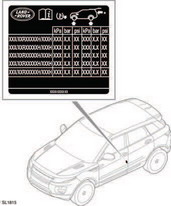Range Rover Evoque: Checking the tyre pressures

Tyre information label location.
 Tyre pressures should be
checked
regularly using an accurate pressure
gauge, when the tyres are cold.
Tyre pressures should be
checked
regularly using an accurate pressure
gauge, when the tyres are cold.
The following procedure should be used to
check and adjust the tyres pressures.
1. Remove the valve cap.
2. Firmly attach a tyre pressure gauge/inflator
to the valve.
3. Read the tyre pressure from the gauge and
add air if required.
4. If air is added to the tyre, remove the gauge
and re-attach it before reading the
pressure. Failure to do so may result in an
inaccurate reading.
5. If the tyre pressure is too high, remove the
gauge and allow air out of the tyre by
pressing the centre of the valve. Refit the
gauge to the valve and check the pressure.
6. Repeat the process, adding or removing air
as required, until the correct tyre pressure
is reached.
7. Refit the valve cap.
READ NEXT:
Keep the valve caps screwed down firmly to
prevent water or dirt entering the valve. Check
the valves for leaks when checking the tyre
pressures.
Do not drive the vehicle with
a
punctured tyre. Even if the punctured
tyre has not deflated, it is unsafe to
use, as the tyre may deflate suddenly
at any time.
Do not fit cross ply tyres.
Do not fit tubed tyres.
Do not rotate tyres around the vehicle.
If the use of tyres not recommended by
Land Rover is unavoidable, ensure
that you read and fully compl
SEE MORE:
General Equipment
Suspension Spring Compressor
Vise
Removal
WARNINGS:
Make sure the spring compressor Safe Working Load (SWL) meets or exceeds
the spring rating quoted in the
Specifcations section.
Always follow the spring compressor manufacturer's instructions.
The spring is under extreme te
With HDC engaged, standard descent speed
will not exceed 20km/h (12.4mph).
While the green warning lamp is continuously
illuminated, HDC target speed can be modified
using the cruise control steering wheel
switches, as follows:
- To increase speed, press and hold switch
(2) until the green po
© 2011-2026 Copyright www.rrevoque.org


 Tyre pressures should be
checked
regularly using an accurate pressure
gauge, when the tyres are cold.
Tyre pressures should be
checked
regularly using an accurate pressure
gauge, when the tyres are cold.
